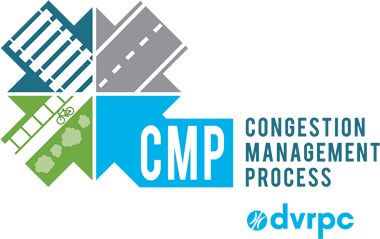
The CMP is an ongoing and systematic process that provides information on transportation system performance. It uses CMP Objective Measures to identify and prioritize congested locations on the regional transportation network and analyzes potential causes of congestion. It recommends a range of multimodal strategies to minimize congestion and increase reliability in order to provide for the safe mobility of people and goods. It evaluates the effectiveness of implemented strategies and uses the results to inform recommendations. The 2023 DVRPC CMP report is an update of the 2019 CMP.
The CMP is a requirement of the federal surface transportation legislation. Regulations require that alternatives to building new Single Occupancy Vehicle (SOV) road capacity be explored first. Where additional capacity is found to be appropriate and necessary, multimodal supplemental strategies must be included to get the most long-term value from the investment.
The CMP advances the goals of DVRPC's Long-Range Plan and strengthens the connection between the Plan and the Transportation Improvement Program (TIP). The CMP Corridor and Subcorridor Area Viewer below identifies congested Corridor and Subcorridor Areas within the DVRPC region.
Visit DVRPC's 2023 CMP Viewer to view Focus Roadway Corridor Facilities, Focus Intersection Bottlenecks, and other information used to identify and develop the CMP Corridor and Subcorridor Area strategies. Visit the 2023 CMP Report
Using the CMP
The CMP is useful for a wide variety of stakeholders, including planners, county and municipal staff, interested citizens, engineers, and policy makers.
Newsletters and Technical Reports
The CMP produces a range of resources beyond the CMP Report, such as newsletters and technical memoranda.